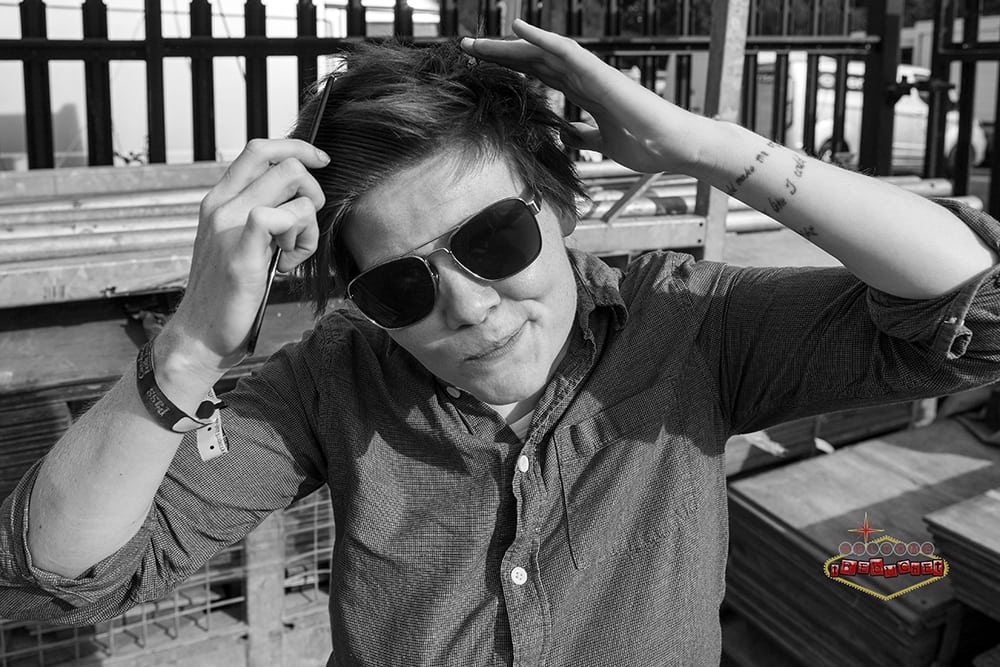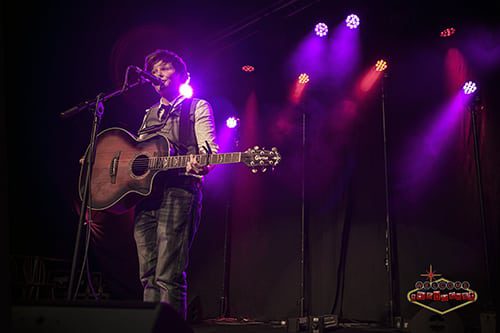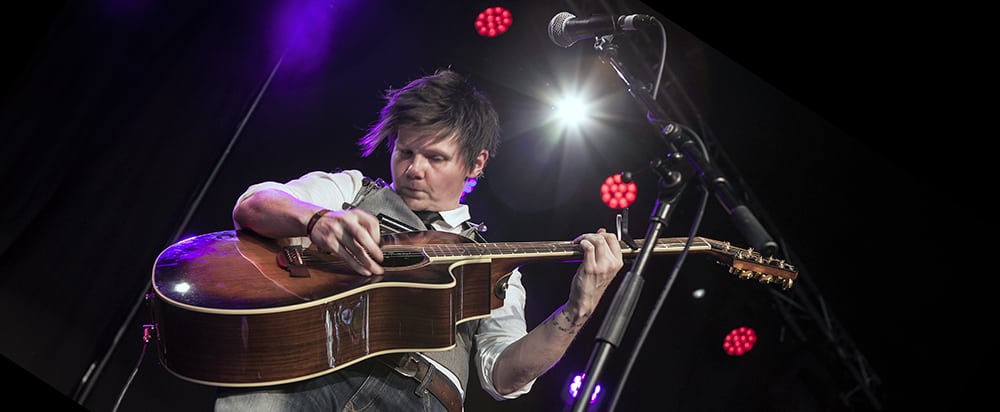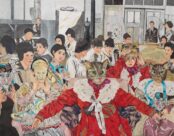[dropcap style=”font-size:100px; colour:#992211;”]S[/dropcap]inger-songwriter and political activist Grace Petrie is about to release her sixth studio album, Queer as Folk, to be followed by an extensive tour in the autumn. We spoke at Cambridge Folk Festival 2018 a couple of days after her well-received Thursday night set.
Sarah Corbett-Batson: In your song, Revolutionary in the Wrong Time, you have a line about never playing the Cambridge Folk Festival and now you have played it! You must be really pleased.
Grace Petrie: Yes, I think lots of people were disappointed that I didn’t play that song on Thursday. I intended to but then I just ran out of time because I was having too much fun but it’s true, yes, I never thought that I would be here. Obviously it’s very much the standard to get to in English folk music so it’s something that I’ve wanted for a number of years and I honestly never thought that I’d get the booking so it’s a bit of a dream to be honest. I’m just very happy to be here and I don’t think that I could have hoped for a better set really. The response from the crowd was just absolutely amazing. I’ve got lots of lyrics actually that have proved to be untrue as the years have gone on!
[youtube https://www.youtube.com/watch?v=aYIMHnSv3XI&w=560&h=315]
Without wanting to pigeonhole your work into one category, would you describe yourself as a folk singer?
Grace: I would. I think that my understanding of folk has come a long way in the last few years. I always saw myself as a folk singer. It’s quite interesting that when I was trying to get successful in the pop or rock singer-songwriter genre, a lot of people were referring to me as folk but then they were people who, like me at the time, knew nothing about folk. When I actually started trying to get gigs on the folk scene, I discovered this varied, incredibly rich, broad genre that contained stuff that is a million miles away from what I do. At somewhere like Cambridge you’ve got everything from singer-songwriters like me to Morris dancers and traditional pipe players, and I totally appreciate it. If you’re someone who likes traditional folk and your understanding of folk is traditional music, then absolutely I’m not a folk singer at all! But I think there’s room within the genre for both of those things to exist.
It’s very important for me that folk music remains a vehicle for radical politics because it always was and that’s where it’s come from. It’s always been the music of the people and it can’t continue to be that if we don’t have some songwriters that are commenting on the times that we live in. So that’s where I see myself fitting in within that spectrum. I do think that I belong there but there are elements of what I do that are more on the punk side of things, there’s some stuff I do that has even been described as comedy sometimes, so I’ve kind of got a foot in a few different camps. Certainly I identify as folk, yes.
You are often described as the female Billy Bragg – how do you feel about that label?
Grace: Yes, I often am! I love Billy Bragg; I want to say that at the outset. I adore Billy Bragg and he’s a huge influence on me. Personally I think that as a society we should strive to do more than find a male counterpart to compare female artists in the same thread. Billy’s amazing and he’s certainly done a lot of amazing things for me, there’s no way I would dispute that. Certainly songwriting-wise, he’s a hero; he’s a big influence and inspiration. But having said that, I think that increasingly what I do is quite different actually. We do very different things and happily so. Nobody beats Billy Bragg at being Billy Bragg and he’s the man for the job, but I’m Grace Petrie. It will always be a complement to be compared to him or anybody like that. Sometimes I get compared to Peggy Seeger or Joni Mitchell. Obviously that’s an amazing complement. I think that I’m maybe a bit too sensitive about the ‘female somebody’ kind of issue.
The things that we’re seeing now are heartless and have no place in 21st century Britain
It also lends itself to this idea that protest music, whatever that means, is a tiny annexed little area with so few people doing it and I don’t actually think that’s true. Politics touches the vast majority of the music that anyone is writing these days. It’s setting a false dichotomy to pretend that there are protest singers and other kinds of singers. If you’re writing about any kind of issue, even if it’s a personal issue, if it’s got any kind of social context then that is political. Far more people are doing it then we maybe suggest when we class me beside Billy Bragg and very few other people. There are more of us doing it than it seems.
Which up-and-coming artists do you rate?
Grace: There’s a singer-songwriter from Leeds called Jasmine Kennedy who I’ve been lucky enough to do some shows with and I try to get her out to shows whenever I can. She is literally one of the best songwriters I’ve ever heard in my life and is incredibly humble about it as well. It’s quite funny to me – you come across so many people in this industry where the mismatch between how good they are and how good they think they are is in one direction. They think that they are incredible and they have this surplus of confidence and she is the opposite of that. She has absolutely no appreciation of how good she is. I’ve been trying to convince her for so many years that she needs to go full-time, she needs to make a life out of it, make a career out of it and I think she’s perfectly happy studying to be an accountant, so it’s quite amazing to me but she’s incredible.
Also Anna Oakes-Monger who started out, as I would arrogantly describe her, as a fan of mine perhaps. That’s how I met her; she came to a lot of gigs. I didn’t even know that she’d started writing these incredible political songs and had brought out this whole record of political songs, which is on Bandcamp, which I would really recommend. I’ve had her support me at a couple of gigs whenever I’m in the North West. So those are names that I would definitely encourage people to look out for.
Sally Pepper is another North Western singer. She’s much more on the punk side of things rather than folk. Again she’s absolutely amazing.
Obviously the 2010 election was a major catalyst for your political songwriting but you’ve also been critical of Labour, particularly Blairism. Do you think that a Corbyn government could bring in the changes that you want to see?
Grace: What can I say about Corbyn? I mean, we’re sitting here today and this issue of anti-Semitism in the Labour Party is on-going and ever deepening and certainly I’ve got issues with the way that’s been responded to. A lot of people ask me if I’ve got issues with Corbyn over Brexit. I have, I voted Remain and I think we should remain and I still hold out some hope that in some form we will remain.

Grace Petrie
But I think that none of that, for me, takes away from the fact that I think the Labour Party is a broad church and for the first time in my life, I’m 31, the Labour Party is a force for left-wing politics. This generation has got a real chance of making an electoral difference with a party that is explicitly operating on a left-wing platform. I’ve never had that, certainly not in the time that I’ve been of voting age. So I am still excited about it.
We’ve got such a short memory in this country. It was only last year that we had this snap election and everybody had written the Labour Party off, everybody had written this Corbyn project off. Everyone had said, not only are they going to lose but it’s going to be the worst defeat in a generation, they’re going to lose more seats than they’ve lost in the last 50 years. Obviously as we saw, that was completely and utterly untrue. Actually what happened was there was a massive grassroots effort in that election that I was very proud to be a part of, and we denied the Conservatives a majority. Nobody predicted that at all. On the day of the election result in 2017, even his harshest critics had to eat their words and say, actually we were wrong about this. But that doesn’t last very long.
I’m not a conspiracy theorist in any way but I do think that since the 1980s, the dominant ideology of neoliberalism, of centre right politics, increasingly right politics, the entire establishment, everything about it is completely embedded in running society in one way. There are people inside and outside of the Labour Party who honestly are so afraid of complete and utter uncivilised catastrophe if we were to do things another way. Those ideas have increasingly been shown in the last generation to not be working. On both sides of the Atlantic, they’re not working and in many ways the rise of Trump is a direct result of that. But I do think that when you look to the sorts of things that younger people, much younger than me, are voting for and hoping for and striving for and aiming for, the things that they prioritise about life, are completely different to the way that we’ve been doing things for the last 30-40 years. The whole world is due a massive swing to the left and I do believe that’s going to happen.
Are there issues with Corbyn? Absolutely, for me there are but I think that it is and always has been about more than him. He’s one person. I didn’t join the Labour Party because of Jeremy Corbyn. I didn’t vote for the Labour Party because of Jeremy Corbyn. I didn’t volunteer for the Labour Party because of Jeremy Corbyn. I did all of those things for the politics that he’s talking about. It could have been anybody. We live in very interesting times. God only knows what will happen between now and when this goes to print! I feel tremendously energised and hopeful about the fact that a politician can go out there and talk about the things that he’s talking about and have that awaken and empower so many young people to actually get out there and join the Labour Party. I think that the Labour Party’s membership is higher than it’s ever been, certainly higher than at any stage of Tony Blair’s entire leadership.
I don’t want to sound like a cliché but I think it is very important to recognise, and I’m not saying that it’s a co-ordinated conspiracy, but we have a tremendously conservative media in this country and certainly the way we run things economically is tremendously conservative. There are people at every level of those establishments who can’t imagine things any other way so I don’t think it’s about them trying to take Corbyn down but I do think that they think that these politics are crazy and they can’t possibly work. It doesn’t mean that it’s true and I think that we will see big changes in the next 10-15 years. I certainly believe that a Labour government is going to come to fruition in the next election and if the Corbyn project is allowed to do what it’s supposed to do, if it’s allowed to enact the mandate that it was elected to bring to life then I’ll be very proud to see that happen. That is something that the most vulnerable people in this country will greatly benefit from and that’s definitely something I want to be part of.
Things are getting more far desperate than when you wrote Farewell to Welfare, with councils now having to decide which of their crucial services to cut…
Grace: Absolutely, yes. I wrote that song when, I’ll tell you the truth, I didn’t know anything about politics. I actually wrote that song as a gay woman because Theresa May in 2010 was made the Minister for Women and Equalities and I knew that she had voted for section 28, against repealing section 28, against LGBT rights many times. The idea that somebody who held those views about people like me was specifically in charge of my civil liberties as a minority was a tremendously frightening concept for me and that was what energised me to write that song. When I wrote it, if you can believe this, it was almost like this satire on the worst possible consequences that austerity could bring about and if anything, eight years on, I feel like the song doesn’t go far enough.
The fact that we could have come so far in 15 years is absolutely amazing
The things that we’re seeing now are heartless and have no place in 21stcentury Britain. It’s absolutely incredible to me that we are one of the richest countries in the world and we have food banks operating in every single city across the country. Some of the most affluent places in Britain have got food banks with regular users. We’ve got food banks that are running out of stock. We have the Red Cross being called in to assist hospitals in the NHS because we’ve cut things back so much.
We’ve got to a point where rhetoric and narrative and the PR machine is so powerful that it’s just incredible to me how the Conservatives can continue to say they’ve put more doctors and nurses in the NHS. Whatever your view is about how much they’ve cooked the statistics on that, the truth is we’ve all seen the photographs of children lying on chairs in hospital corridors. However much they’ve put into the NHS, it’s clearly not enough. We all know that there’s a clear shortage. There are waiting lists that are completely unacceptable.
I feel like a lot of the things that Labour are talking about now are important. It is true that in the last election they brought a lot of voters back from UKIP and, as a movement, I think that we need to soul search about what that means and where those people have come from and what those people want. Certainly in the context of the conversation around Brexit, what that means to those people and how those people got to a point where they were so disenfranchised by mainstream politics that they felt like UKIP was the only option for them. I do actually believe that for a long time, the truth is that everyday people in the street in Britain honestly felt like there were no politicians fighting their corner at all. For better or for worse, I think that Jeremy Corbyn has changed that.
Do you feel optimistic for the future in relation to LGBT rights?
Grace: Yes, I definitely feel optimistic. Honestly I feel optimistic about everything because, again I keep saying this, I look to the things that younger people than me are voting for and are saying. I’m sure I read an article recently that said that 50% of millennials identify as not straight. That is absolutely incredible. When I think of how, it was only 15 years ago that I was in school and I was completely closeted. That is unimaginable to me – the fact that we could have come so far in 15 years is absolutely amazing. Having said that, even in the queer community there are issues.
SC: Transphobia is such a live issue at the moment…
Grace: Sure, I was about to say that. Even in the queer community we have weeds in our garden. I’ve seen this issue brewing over the last two years over transphobia coming from a very small, I can’t express to you how small it is, a very small but tremendously vocal minority of people who identify themselves as radical feminists and have this incredibly hardline doctrine about trans people that is just transphobia. Often it’s wrapped up in this very high-minded intellectual sounding jargon but actually at the base of it, it is just prejudice the same as any other old prejudice.
Often it’s wrapped up in this very high-minded intellectual sounding jargon but actually at the base of it, it is just prejudice the same as any other old prejudice.
You can actually see that in the fact that some of these groups, if you look into it, are aligning with some of the most ridiculously hardline fundamentalist far-right Christian groups in the USA, who have the same priorities as them. It’s an ironic day for me that I see people who proclaim themselves to be feminists and proclaim themselves to be lesbians and I see them sharing articles written by Rod Liddle, who has been so vocally homophobic throughout his entire career, and proclaiming him as some kind of saviour of lesbians. I find that so insulting. But I also think that, in exactly the same way as I would say about conservative politics and the fact that that’s imbedded in various levels of the media.
Transphobic radical feminists are not a big group. They’re quite an influential group because they exist in quite high levels of academia and a lot of them, for some reason, have this inexhaustible free pass to publish their views in very large scale media outlets but that won’t last forever. Young people and, as I say, the vast majority of people of any age are just not buying that; they’re not subscribing to that. But that is something that we’re having to contend with in the queer community.
It’s something that we’ve already had to contend with in the Labour Party. I have to say that, for all of his faults or flaws, I feel like Jeremy Corbyn’s response to that was one that made me very, very proud to have campaigned for him. He was clear that trans women are women, there is no place for transphobia in the Labour Party and if that’s something that you can’t get behind then you can leave. I know that they basically did leave.
None of that is to diminish the fact that we have come a long way in terms of LGBT rights as a whole in the last however many years. Having said that, I think that something that I’ve come to understand is that there will always be people who are working to take these rights away from us. We can never get complacent about that. We can never lay down arms when it comes to that sort of thing. Right now we have an unimaginably hard right government in charge of the USA and essentially in charge of the world. Donald Trump is the most powerful person in the world right now. He has shown himself already to be politically transphobic and I think that politically he’s done very homophobic things as well. I definitely think that his support base is tremendously homophobic and we certainly have a very, very long way to go before we’ll achieve anything close to equality.
But I think it’s incredible how far we have come. Even to take a completely random example. The other day I was in the shop and I saw a packet of Skittles sweets and the bag was completely white and everything that was written on it was just in black ink. Obviously Skittles are normally a red bag and rainbow coloured sweets. I picked it up thinking, what’s that about, and it said something like, because there’s only one rainbow that matters during Pride month. It really meant a lot to me because sweets like that, I guess, are aimed at children. I have to tell you that when I was a teenager, I would have found something like that completely unimaginable. That would have seemed like such a long way away and here we are. So I think that things do get better and it’s one of those things that, however hard things still seem when you think about things on a macro scale, the world turns. You don’t necessarily feel it moving, it’s a gradual thing but I think things have come a long way.
Check out part 2 of this interview here.
Cambridge Folk Festival 2018 review here.
Grace Petrie played Cambridge Folk Festival 2018 on Thursday, 2ndAugust.
Her album Queer as Folk is released on 14th September and is followed by a tour of the UK and Ireland in October. Click here for tour dates
Interview by Sarah Corbett-Batson
Photographs copyright Carl Byron Batson – not to be reproduced or used without express prior written permission




















